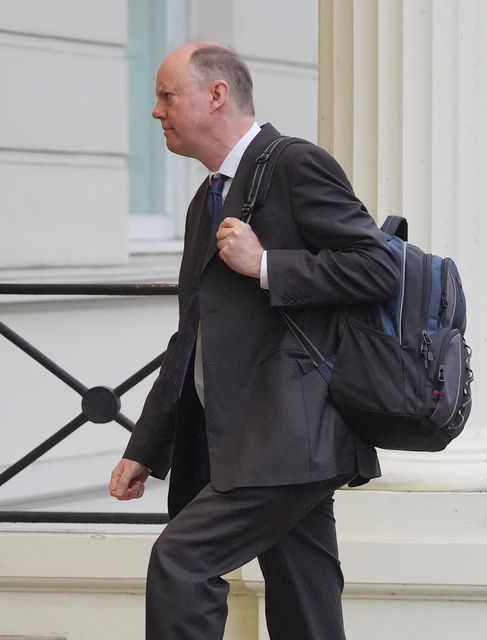The “volunteer spirit” of the British public drove the success of the UK’s Covid-19 vaccination programme, the nation’s top medic has said.
England’s chief medical officer, Professor Sir Chris Whitty, praised the million people who put themselves forward for clinical trials and other studies during the pandemic.
Meanwhile, he told the UK Covid-19 Public Inquiry that during a vaccination campaign, governments should not assume they are seen as the “good guys” or that “everyone loves” the NHS.
Sir Chris appeared in front of the inquiry in London on Monday.
We need your consent to load this Social Media content. We use a number of different Social Media outlets to manage extra content that can set cookies on your device and collect data about your activity.
Module four is exploring the development of vaccines and their roll-out, as well as the use of existing and new medications for the virus.
Hugo Keith, lead counsel to the inquiry, asked Sir Chris about the “considerable success” in both the vaccine development and roll-out and the “therapeutics” programme of work.
Mr Keith said: “That was the product of the vast amount of work, dedication and attention on the part of a very substantial number of government bodies, entities, advisory committees, scientists, epidemiologists, researchers, academics and the like. Is that a fair summary?”
Sir Chris replied: “It’s a very fair summary, and I think we should all pay huge tribute, in fact, to not only the scientists in the UK and internationally, and prior to the pandemic who worked on this, many people, as you say, who came in to advise government, from academia, from industry and elsewhere, but I think above all, to the people who volunteered.
“Over a million people in the UK volunteered for clinical trials and other studies, and that was really what drove this, and it’s that volunteer spirit which I think underlies many of the successes that you outline.”
Professor Sir Chris Whitty said the UK had taken years to reinstate its non-Covid clinical trials after the pandemic (Jonathan Brady/PA)
Asked about communication on vaccination campaigns and what could be done to “engender trust and reduce barriers”, Sir Chris said: “I think that it is very clear that we didn’t do as well on this as we both should have, and actually, in my view, could have.
“What doesn’t work, and I think sometimes people think that it’s going to, but it clearly is not going to work, is people say, ‘Well, there’s a low uptake in X group, so why can’t the chief medical officer go out and say: ‘Please take it up’.
“The people who are cautious about vaccines for a whole variety of reasons, if they were going to listen to the chief medical officer (CMO), they’d already done so.”
He added: “It has to go through trusted interlocutors … it’s actually the continuous communication in both directions, learning in both directions, hearing what people are concerned about, and addressing it or learning from it, I think which makes this work.
“There’s a limit to what a CMO can do, but there’s quite a lot that a government can do, but a government shouldn’t assume … that they’re going to be seen as the good guys.
“And I think the NHS sometimes, and I speak as a member of the NHS, assumes that everyone loves them. Actually, not everyone does. And they’re seen as authority by some groups.
“And you need to be pretty realistic.”
Meanwhile, Sir Chris said that the UK had taken years to reinstate its non-Covid clinical trials after the pandemic.
He told the inquiry that the UK had “swung” all of its clinical trial capacity towards Covid-19 but that there was a “price to be paid” for this.
“Re-standing those trials up again – we closed things down very fast and very effectively, and that gave us space to do all the studies that were needed for Covid – re-standing the other studies back up, (it) took a lot longer than I think we anticipated, so it’s taken us about two-and-a-half years from the time we’ve swung it around to get back to a point where everything’s beginning to get back to a normal state,” he said.
“So there is a price to be paid, because all the studies that were stopped were doing very important and useful things in other areas of medicine.
“So this is a trade-off, but I think in a national and international emergency like this, my own judgement is this was the right trade-off, but we shouldn’t pretend there wasn’t a price, there was a price.”
And he called for better data sharing across the NHS, warning that the way the health service used data was now “less good” than it was during the crisis.
He said: “I regret to say I think we have slipped backwards since our time in the pandemic in terms of bringing data together – so I think we are now in a less good and more fragmented place than we were in the middle of the pandemic.”
Public hearings for the fourth module of the UK Covid-19 Public Inquiry started in London last week and will run until January 31.
